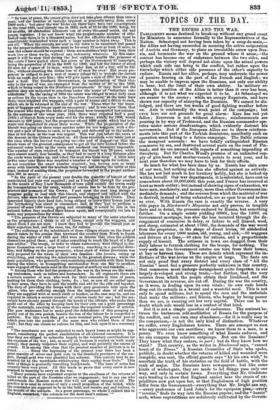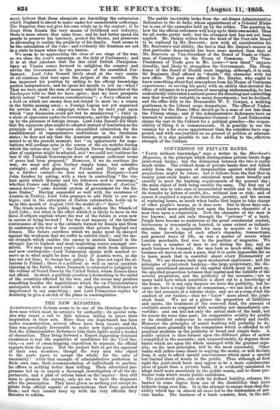TOPICS OF THE DAY.
THE RECESS AND THE WAR.
PARLIAXEST seems destined to break-up without any grand event for Ministers to announce formally to the Representatives of the Nation. Sebastopol not having been taken by a coup-de-main,- the Allies not having succeeded in securing the active cooperation of Austria and Germany, to place an irresistible screw upon Rus- sia, and terminate the war on the ground where it arose,—the contest has become one of endurance between the two sides, and perhaps the victory will depend not alone upon the actual powers which each side can bring to the conflict, but rather upon the knowledge which either side possesses of the other's capacity to endure. Russia and her allies, perhaps, may underrate the power of passive bearing on the part of the French and English ; we may be unable to impress upon the Russians, not only our ability to bear, but the limit of their own ability. In military re- spects the position of the Allies is better than it ever has been, although it is not what we expected it to be. At Sebastopol we are nearer to the enemy ; while we occupy Eupatoria, and have shown our capacity of annoying the Russians. We cannot be dis- lodged, and there are ten weeks of good fighting weather before us. Asia is confessedly the weak point of the campaign ; but even here are not grounds for great alarm : Kars has not yet fallen ; Erzeroum is not without defence; reinforcements are pouring in by way of Trebizond, and the Russian commander ope- rates under serious disadvantages, which evidently distract his movements. But if the European Allies are to throw reinforce- ments into this part of the Turkish dominions, manifestly such an operation must belong to a future campaign. The Baltic returns the meagrest accounts : we have totally extinguished Russian commerce by sea, and destroyed several posts on the coast of Fin- land; and we are amused with reports of something impending at Swea.borg. But Sir Charles Wood's promise of an unlimited sup- ply of gun-boats and mortar-vessels points to next year, and to next year therefore we may have to look for their effects.
So much for -what has been done by us. Russia has slain some of our men, but nothing else has she effected against us actively. She has not lost much in her territory bodily, but she is locked-up within herself. Our war departments, it is calculated, have cost us somewhere about 50,000,0001. this year, and France has incurred at least as much outlay ; but instead of showing signs of exhaustion, we have men, machinery, and money, more than either Government im- mediately demands ; and the sources from which the materiel of war is derived, instead of being exhausted, are as open to us and as free as ever. With Russia the case is exactly the reverse. A very able paper in Blackwood's _Magazine not only proves, in tangible facts and in detail, the pressure endured by Russia, but something further. On a single estate yielding 60001., less the 1500/. on Government mortgage, less also the loss incurred through the de- rangement of commerce in delay, or failure to sell linseed, wool, and sheep, estimated at about 1700/., the demands of the war wrest from the proprietor, in the shape of direct levies, 30 ablebodied labourers for every 1000 males, old, young, and sick,-10 waggons and drivers at a time,-40 oxen for rations, and a proportionate supply of biscuit. The artisans in town are dragged from their daily labour to furnish clothing for the troops, for nothing. The very serfs on the Government estates are torn from their homes, at hay or harvest time. These are details which represent the in- flictions of the war-levies on the empire at large. The facts are not only proof that every district and every class of "All the Russias " must feel a pressure perfectly unknown in this country, that commerce must undergo derangement quite forgotten in our largely-developed and strong trade,—but further, that the very sources from which the people obtain their livelihood, and the Government its revenue, are cut off. During the war the country, as it were, is feeding upon its own vitals ; its own rude hands drag out its entrails in a brutal and a wasteful meal. This is not only to spend millions, but to spend the men and the materials that make the millions ; and Russia, who begins by being poorer than we are, is running out her very capital. There can be no doubt which side would lose in a contest of that kind.
But it is not a simple question of endurance. The contrast be- tween the barbarous self-mutilation of Russia for the purpose of the conflict, and our own easy abundance,—for it is really easy in the coin parison,—is not the only kind of distinction. Whatever we suffer, every Englishman knows. There are amongst us men who aggravate our own sacrifices; we know them to a man, to a penny. We even know something of what Russia endures, and we can compare the relative outgoings. But can the Russians? They know what they endure, in part ; but do they know how we stand ? That country, as the writer in Blackwood says, "cannot boast of its Times." A Russian Councillor of State who spoke, publicly, in doubt whether the returns of killed and wounded were complete, was sent, the official gazette says "by his own wish," to ascertain the truth of his statistics on the field of battle, with the rank of major. The Russians have newspapers; but like some kinds of wicket-gate, they are made to let things pass only one way, and only in certain forms. Everything that Mr. Gladstone says tending to show that England cannot bear the strain of ex- penditure now put upon her, or that Englishmen of high position differ from the Government—everything that Mr. Bright can say, —every preference of Lord John's for the equipoise plan,—every "reverse," finds its way into the Russian papers; and the "heroic' serfs, whose superstitions are sedulously cultivated by the Govern-
meat, believe that these alarmists are foretelling the submission which England is about to make under her unendurable sufferings. The Emperor does not give his own vitals up to the contest: if he drags from Russia the very means of livelihood and industry, there is more where that came from ; and he had better spend his people to preserve his territory, protect his throne, and persevere in advancing to realize the prophecy of his family. Such seems to be the calculation of the Czar; and. evidently the Russians are not in a state to know when they are beaten.
We seem to be approaching the close of one stage of the war, as we close the year's campaign on the field of Parliament; and it is at that juncture that the late chief British Plenipoten- tiary at Vienna comes forward to enlighten the country and advise the Government in the presence of the assembled Par- liament. Lord John Russell lately stood at the very centre of all relations that bear upon the subject of the conflict. He has improved his position by adding to his official knowledge perfect independence; and he opens his mouth to tell us—what That we have spent the sum of money which the Chancellor of the Exchequer tells us that we have spent ; that we have prospects which induce "most serious considerations"; a Navy efficient on a field on which our enemy does not intend to meet us; a season in the Baltic passing away ; a Foreign Legion not yet organized for service in Asia ; a campaign before us for next year upon which "any discussion could not but be mischievous " ; Italy in a state of oppression under its-Governments ; and the Pope propped- up by the presence of foreign troops. Lord John Russell did think that the equipoise planmight be adopted instead of limitation as the principle of peace; he expresses unqualified admiration for the establishment of representative institutions in the Sardinian states : he does not say that the Austrian proposals could be as- sented to at the present moment, but "an opportunity for nego- tiations will perhaps arise in the course of the six months during which the recess may last " ; the Turkish Envoy thought that the plan of equipoise might be adopted, and" we could not continue the war if the Turkish Government were of opinion sufficient terms of peace had been proposed." However, if we do continue the war, we must not give Turkey simply loans, but subsidies outright ; and after glancing at Poland and Italy as allies in a. further contest—he does not mention Hungary—Lord John finishes by asking, with a. view to controlling "the vio- lent spirit which Mazzini and his followers seek to encourage," , 'whether France and England, "with the assistance of Austria," j cannot devise "some durable system of government for the Ro- man States." Having succeeded so well with the assistance of j Austria in Turkey, Lord John proposes to add Italy to our pro- , teges ; and in the enterprise of Italian reformation, holds up to ' us in this mouth of August 1865 the model of—" Spain"! The tirade makes the public laugh ; it saddens the friends of Lord John ; but what is the effect which it is likely to have in the three Northern capitals where the war of the future is even now in course of being brewed P For the real measure of the further continuance of the war is the estimate formed by Russia and those in conference with her of the councils that govern England and France. The future sacrifices which we make must be charged against the weakness that we suffer to exhibit itself ; and the mo- ral strength which enables the enemy to sustain himself in the struggle has its highest and most inspiriting source amongst our- selves. We may open next year's campaign with fresh alliances and new contingents—Lord Palmerston speaks with marked re- I serve as to 'what might be done in Italy if Austria were, as she j has not yet done, to change her policy ; he does not repel the al- 1 lusions to Poland ; there is a political as well as naval question ripening in the Baltic, where Denmark is subjected to indignity in ' the refusal of Sound Dues by the United States, whom Russia dares not offend. In short, a political question is fermenting in the midst of the countries affected by the war, and the recess may produce something besides the negotiations which the ex-Plenipotentiary anticipates with so much relish : on that question Ministers are importuned to say something ; and Lord Palmerston replies by declining to give a sketch of the plans in contemplation.



























 Previous page
Previous page